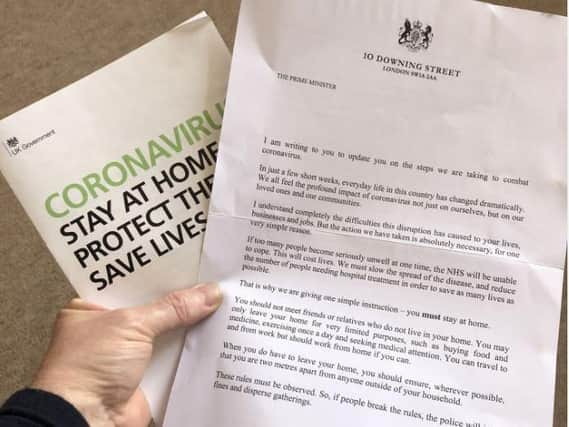'Effects of Covid-19 still need tackling...but we have to do this together'


My fellow Chron columnist and deputy chief executive of the Northamptonshire Commmunity Foundation, Rachel McGrath, recently wrote a highly informed piece for these pages about the prevalence of food poverty in our society and how that prevalence has grown since the onset of the pandemic.
At a time when the use of outlets like food banks has become far more frequent – and accepted – as a means of existence by people never confronted by that reality before, it struck me how right Rachel is when she wrote that, as a civilised society, nobody, anywhere, should be going hungry.
Advertisement
Hide AdAdvertisement
Hide AdBy the same token, though, in these same days and in the same ‘civilised‘ society, is poverty in general about to surge dramatically?
You might have noticed a move away from the reporting of the medical and scientific aspects of the Covid-19 outbreak recently. The broadcasted daily press briefings have all but disappeared, being replaced once again by daytime television, unless there is a political announcement of policy – or policy change – needing to be announced.
Admittedly the rate of outbreak of the current strain of coronavirus had been in decline in the last few weeks, but people are still dying and people are still becoming ill.
Instead it has been largely left to the print media to maintain the wider aspects of reporting the latest statistics to the public, and faithfully it has done so, reporting also on the other aspects of coronavirus which are themselves shaping our future society. Mental health issues have become far more widely discussed, as well as our response to them.
Advertisement
Hide AdAdvertisement
Hide AdA fortnight after lockdown began, the Guardian reported on the incidence of Post Traumatic Stress Disorder and the number of people exhibiting symptoms of it, having begun to live in an utterly alien situation, cooped up 24/7 with family members and often with little space to think, breathe or find some kind of solace.
Clinical psychologist Steven Taylor wrote: “If coronavirus is anything like Sars, [the percentage of people developing PTSD] could be substantially higher among those infected with the virus. A four-year follow-up study of 70 Sars survivors found that 44 per cent of people developed PTSD. Even after recovering from Sars, 82 per cent of these people had PTSD years later.”
He added that even those who aren’t infected could develop psychological symptoms, with lasting anxiety a possible consequence of isolation and confinement.
He’s right, of course, and with some now being quoted as saying that we should be preparing for a new wave of C-19 accompanying the onset of the shorter days of autumn, we should also understand the likely pressures that will be visited on the NHS, not only with cases of coronavirus, but also PTSD too. Will the coming two to three months allow us to rid the nation of the disease? I’m no expert, but I wouldn’t rush to bet on it.
Advertisement
Hide AdAdvertisement
Hide AdThe remarkable demonstrations of community support that I’ve heard about – and shared on the radio – may well be much needed as we head into 2021. Those demonstrations will need to be backed up by active support for local business too, because without money circulating to keep our economy – local and national – alive, the language of Rishi Sunak’s grim warnings about the depth of the recession might have to be re-cast in terms of depression instead.
We still need to help each other. Our economic and clinical survival depends on it.